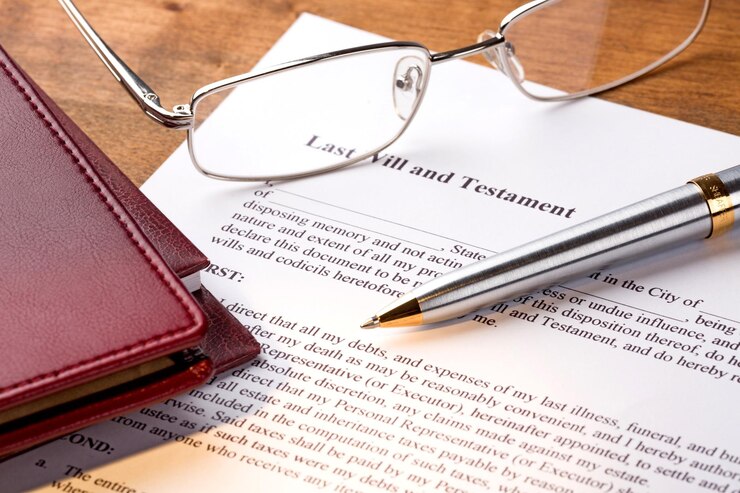A will is a legal document that outlines the distribution of your assets and the guardianship of your minor children after your death.
Making a will ensures your wishes are carried out, provides financial security for your loved ones, and minimizes disputes among family members. There’s nothing worse than loved ones jumping through hoops trying to find out if someone has a will.
The Basic Elements Of A Will

The Testator
The person creating the will must be at least eighteen years old and of sound mind. This person is called the testatorThis means they must be able to understand the nature and extent of their property, as well as the consequences of their actions.
The Beneficiaries
The beneficiaries are the individuals or organizations who will inherit your assets. Clearly identify each beneficiary by name, relationship, and contact information. If you’re leaving property to multiple beneficiaries, specify the percentage each will receive.
The Executor
The executor is responsible for administering your estate and carrying out the terms of your will. Choose someone trustworthy, organized, and preferably experienced in handling financial matters. Name an alternate executor in case the primary one is unable or unwilling to serve.
The Guardian
If you have minor children, appoint a guardian to care for them until they reach adulthood. Choose someone who shares your values, is capable of providing a loving and stable environment, and is willing to take on the responsibility. It is also wise to name a backup guardian.
The Witnesses
A will must be witnessed by at least two people who are not beneficiaries of the will. These witnesses must be present when the testator signs the will and must also sign it themselves.
How To Create A Will

Step 1: Assess Your Assets
Create an inventory of your assets, including real estate, vehicles, personal possessions, bank accounts, investments, retirement plans, and life insurance policies. Include any debts, such as mortgages, loans, or credit card balances.
Step 2: Determine Your Beneficiaries
Decide who you want to inherit your assets. You may choose to distribute your estate among family members, friends, or charitable organizations. Consider the needs and circumstances of each potential beneficiary, and think about the impact your bequest might have on their lives.
Step 3: Assign an Executor and Guardian
Select an executor who will be responsible for administering your estate and a guardian to care for your minor children. Make sure to discuss your wishes with these individuals and ensure they are willing to accept the responsibilities.
Step 4: Draft Your Will
Write your will using clear, concise language. Start with a statement declaring the document as your last will and testament, and include your full name and address. Outline your wishes regarding the distribution of your assets, the appointment of an executor and guardian, and any specific funeral or burial arrangements.
Step 5: Sign and Witness Your Will
Sign your will in the presence of at least two witnesses who are not beneficiaries. These witnesses must also sign the document, attesting that they observed you signing it willingly and without undue influence.
Step 6: Store Your Will Safely
Keep your will in a secure location, like a safety deposit box or a fireproof safe. Inform your executor and close family members of the location of your will, so they can access it when needed.
Reviewing And Updating Your Will
It’s important to review your will regularly, particularly after significant life events such as marriage, divorce, the birth of a child, or the death of a beneficiary. Update your will as needed to reflect your current circumstances and wishes.
Seeking Legal Assistance
While it’s possible to create a will on your own, consulting with an estate planning attorney is recommended, especially if you have a large estate, complex family dynamics, or concerns about taxes and legal issues. An attorney can provide guidance and ensure your will complies with the laws in your jurisdiction.
The Role Of Trusts In Estate Planning

In some cases, creating trust in conjunction with your will can offer additional benefits. A trust is an arrangement that is legal in nature. In this, a trustee manages and holds assets for the benefit and efficiency of one or more beneficiaries. Trusts can help reduce estate taxes, provide for minor children or disabled family members, and protect your assets from creditors.
Revocable and Irrevocable Trusts
There are two types of trusts. They are revocable trusts and irrevocable.
A revocable trust may be changed or revoked by the specific grantor during their lifetime.
In contrast, an irrevocable trust cannot be altered once it is established, offering potential tax advantages and asset protection.
Estate Planning for Digital Assets
In today’s world, it is essential to consider your digital assets when creating a will. Digital assets include online accounts, social media profiles, email accounts, digital photos, and electronic documents. Include instructions in your will for accessing, managing, and distributing these assets, and consider appointing a separate digital executor if necessary.
The Importance of Communication
Discussing your estate plan with your family members and beneficiaries can prevent misunderstandings and disputes after your death. While these conversations may be sensitive or uncomfortable, they can provide an opportunity to clarify your intentions and ensure your loved ones understand your wishes.
Conclusion
Making a will and planning what to leave behind is a crucial aspect of estate planning. By taking the time to assess your assets, determine your beneficiaries, and create a legally binding will, you can ensure your estate is distributed according to your wishes and provide financial security for your loved ones.
Regularly reviewing and updating your will, seeking legal assistance when needed, and considering additional estate planning tools such as trusts can further enhance the effectiveness of your estate plan. Finally, fostering open communication with your family about your intentions can contribute to a smoother transition and minimize potential conflicts.
Read Also:




























